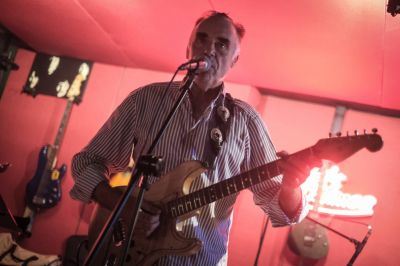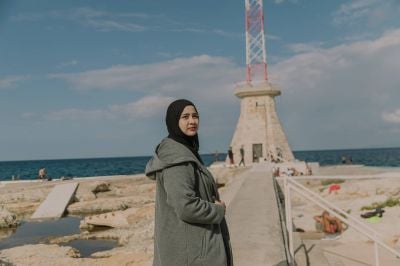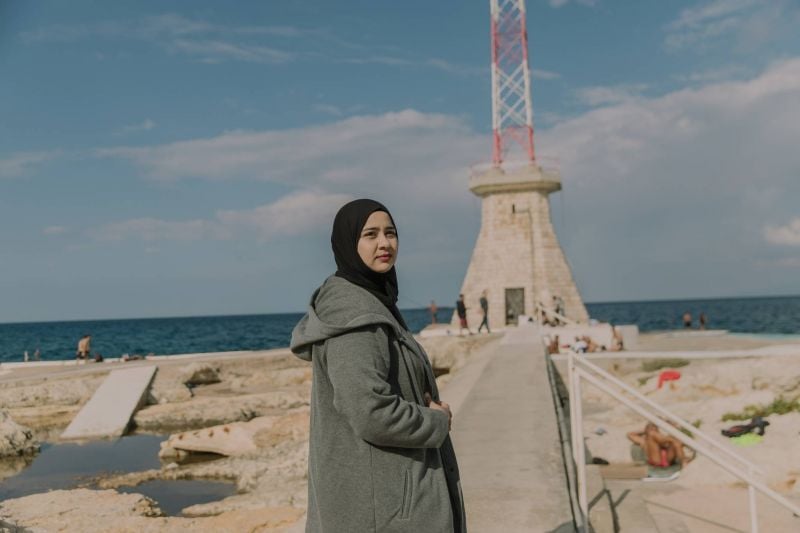
Shatha Hanaysha at Beirut's Corniche, Nov. 10, 2022. (Credit: Maria Klenner/L'Orient Today)
BEIRUT — “You know, when I arrived in Beirut, it was the first time I saw the sea?” Shatha Hanaysha muses, while she watches children chasing each other along the Corniche.
“Most of us in Palestine are denied a visit to the sea by the Israelis, so I was curious to know why people love it so much. The people who walk and run along the Corniche, the children swimming, the silent fishermen. I get it now. It’s the ultimate symbol of freedom.”
The 29-year-old journalist arrived in Beirut in September to pursue a two-year master’s degree in media studies, as the recipient of the Shireen Abu Akleh Endowed Memorial Scholarship. The program was established between the American University of Beirut and Yafa Foundation, a UK-registered group, to “commemorate and celebrate the life of an enduring figure of hope and peace.”
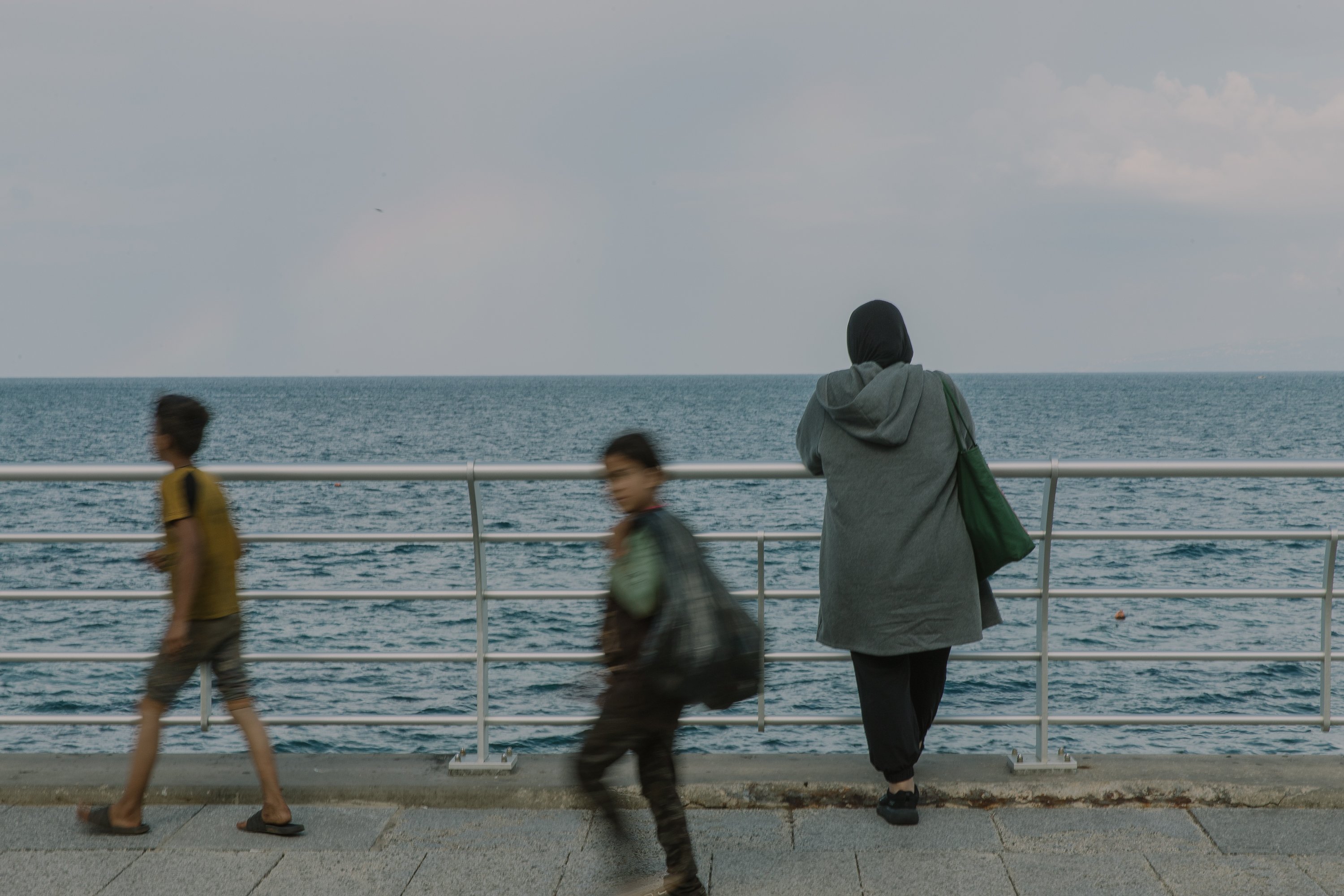 Shatha Hanaysha at Beirut's Corniche, Nov. 10, 2022. (Credit: Maria Klenner/L'Orient Today)
Shatha Hanaysha at Beirut's Corniche, Nov. 10, 2022. (Credit: Maria Klenner/L'Orient Today)
A longtime Al Jazeera correspondent and veteran broadcast journalist, Abu Akleh became an icon of TV news in and about Palestine. Multiple generations in the Arab world and the diaspora grew up with her charismatic smile and tenacious reporting. Israeli forces shot her dead on May 11, 2022 as she was covering an Israeli army raid on a displacement camp in the Palestinian city of Jenin, a short drive from Hanaysha’s home village.
Six months on, Hanaysha still finds it difficult to talk about Abu Akleh, the young journalist’s role model. While speaking in recent days with L’Orient Today, Hanaysha interrupts herself at times: “I’ll talk about Shireen later.”
She turns to the sea as her thoughts seem to slowly drift away.
“So, I often come here and video call my family to show them the sea while we talk … “You know the white foam that covers the waves? When I saw them for the first time, I thought they were fish.” She shakes her head and laughs. “This should be common knowledge for a Palestinian. But even that has been taken away from us. Another part of our soul.”
‘I want to be a journalist like Shireen’
Before coming to Beirut, Hanaysha was working as a reporter for Ultra Palestine and Middle East Eye, regularly covering daily life and frequent raids in Jenin. She grew up just a couple kilometers away from the city, in the village of Qabatiya.
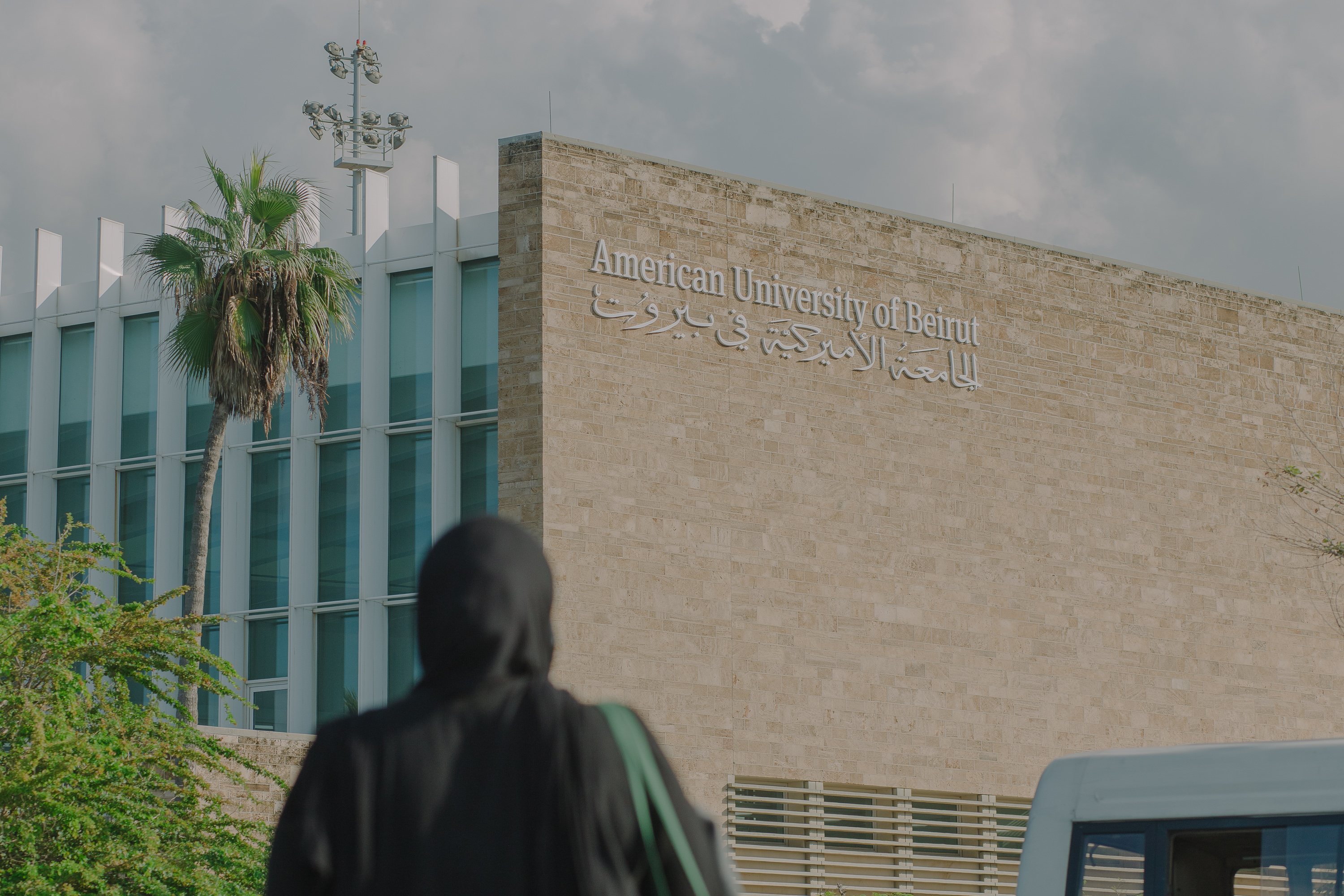 Shatha Hanaysha, Nov. 10, 2022. (Credit: Maria Klenner/L'Orient Today)
Shatha Hanaysha, Nov. 10, 2022. (Credit: Maria Klenner/L'Orient Today)
How did a young woman from a small village end up covering nightly, often deadly, raids?
When she was a child, Hanaysha remembers her family members always telling her to “talk like Shireen.” She reveled in imitating Abu Akleh as best as she could.
“I would pretend to hold a microphone and report on the news with her mannerisms and voice,” says Hanaysha. When someone asked her what she wanted to be when she grew up, she would often answer: “I want to be a journalist like Shireen.”
At first, her parents thought it was just a childhood fantasy. But Hanaysha only became more determined when people started telling her it would be safer to study Arabic and become a teacher, she says.
Ultimately, when she started university, she found a way to do both: she majored in Arabic language and media.
“I think when I saw what was happening in Palestine, I dreamt to hear people speak about it. And my father always encouraged me to read, be curious about everything and discover the world. And this led me to journalism, where I get to do all those things.”
Though she says she has faced some challenges as a young woman journalist, she prefers not to dwell on those. “I don’t like to focus on the negatives or the difficulties of my work. I want other young girls to look at me, the way I used to look at Shireen, and think: ‘I want to do what she does and nothing will stand in my way.’”
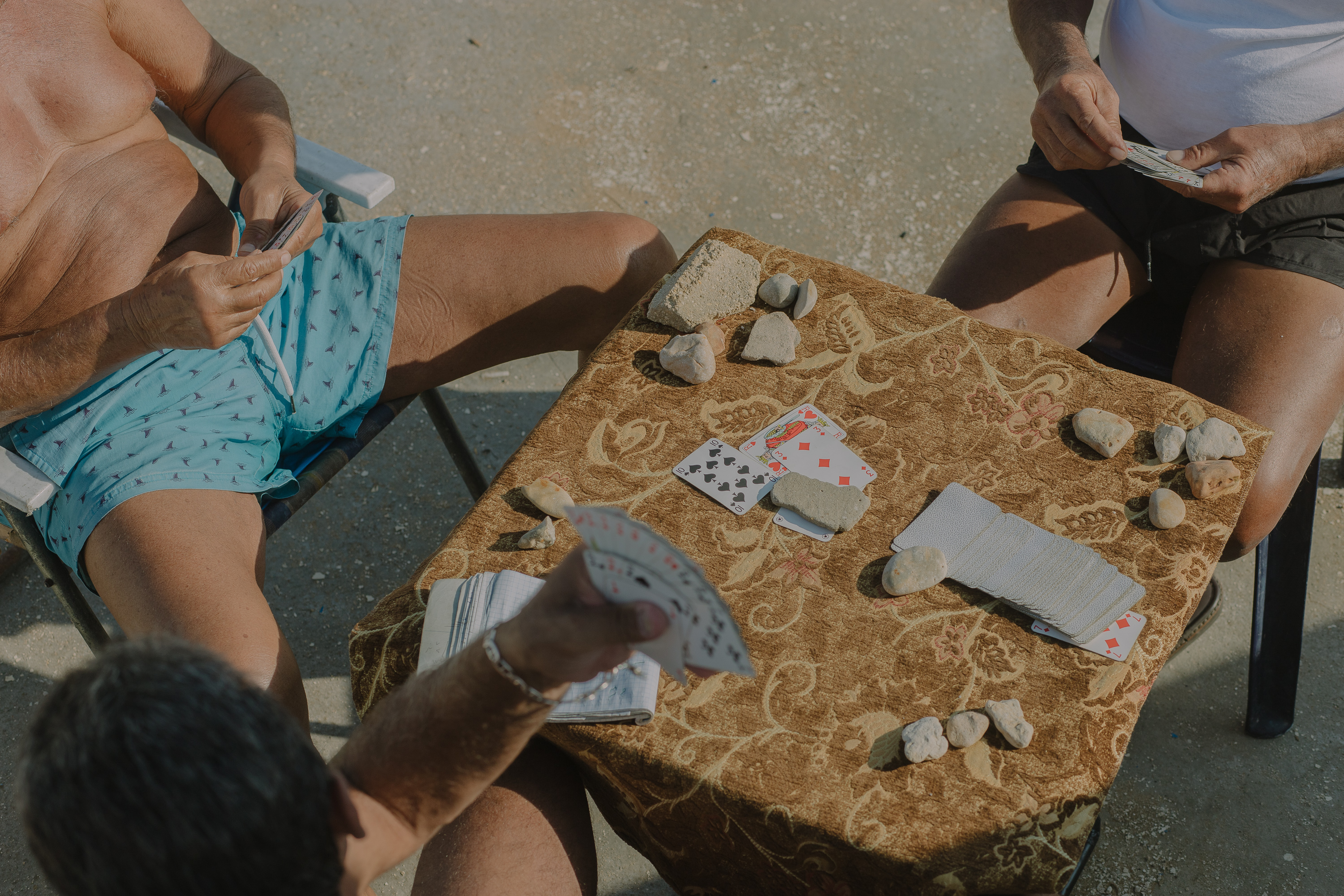 People play cards at Beirut's Corniche, Nov. 10, 2022. (Credit: Maria Klenner/L'Orient Today)
People play cards at Beirut's Corniche, Nov. 10, 2022. (Credit: Maria Klenner/L'Orient Today)
Her parents’ eventual support did enable her to follow her dreams, Hanaysha admits. “It’s not a traditional road to take. When I would walk around my village taking pictures with my camera, everyone was wondering what I was doing,” she says, laughing. “That was always fun for my father.”
Social journalism and censorship
According to Hanaysha, the rise of social media has made a big difference in how people abroad perceive what is actually happening in Palestine.
“Instead of only seeing the story in a media outlet, you also get to see what Palestinian journalists and people who actually live there share on their social media,” she says. “No one can manipulate the truth. That’s why so many of our accounts have been shut down. Because they don’t want anyone to see the truth. They closed my Instagram and my Facebook accounts.”
While attending a conference on Zoom about journalism and social media in recent months, she mentioned to the other attendees that her Instagram account had been deleted, Hanaysha recalls.
“About an hour after I mentioned this, it was reactivated again. No one told me who made this happen.”
Much has been written about how Palestinian journalists and other public figures who advocate for Palestinian rights are systematically targeted on social media, negatively singled out, prevented from doing their jobs and even harassed. It seems to be a conscious tactic to occupy their thoughts in addition to their land, by not only perpetually and publicly questioning their version of events but also through concerted efforts to smear their reputations, which in increasingly more cases has led to journalists being fired.
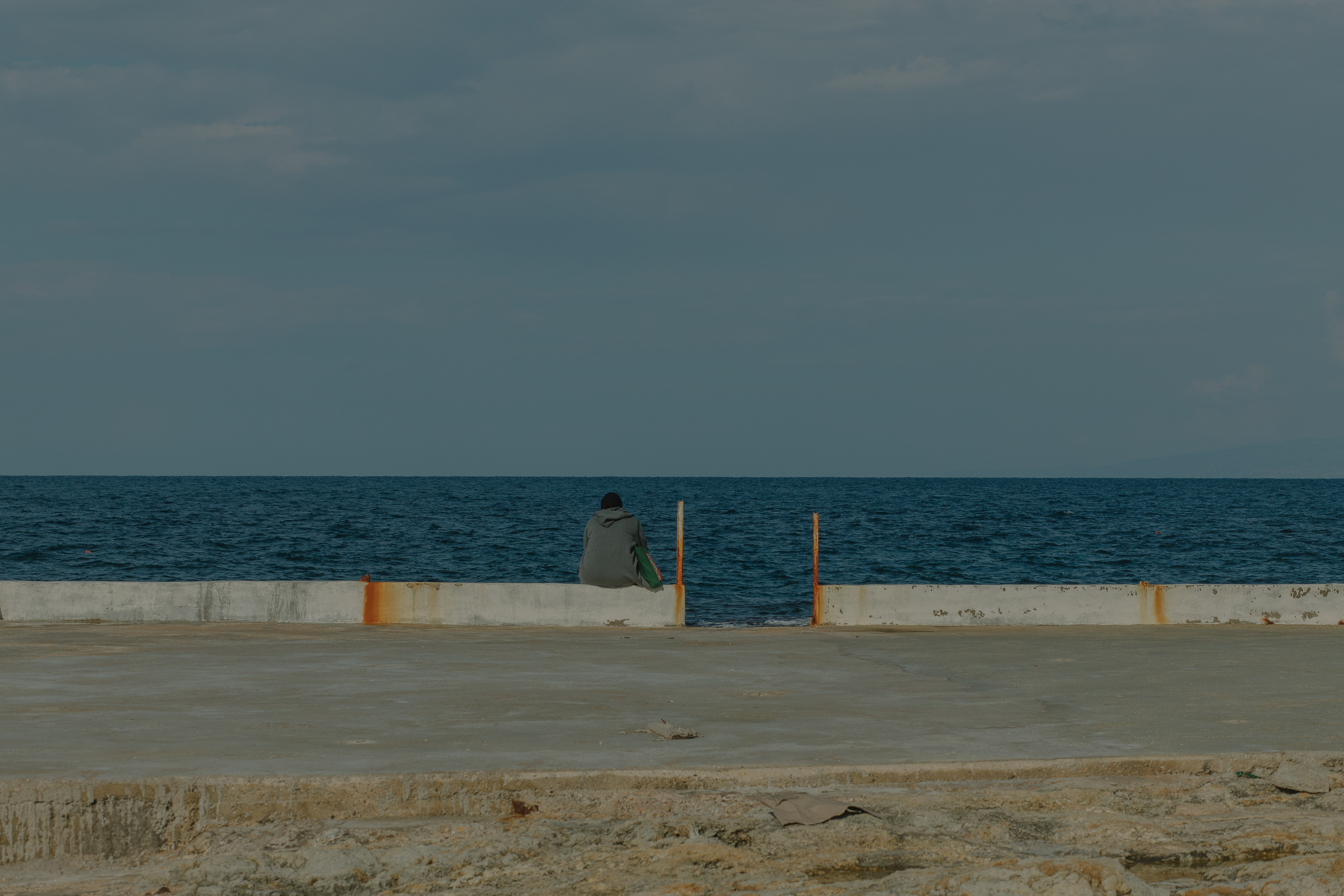 Shatha Hanaysha at Beirut's Corniche, Nov. 10, 2022. (Credit: Maria Klenner/L'Orient Today)
Shatha Hanaysha at Beirut's Corniche, Nov. 10, 2022. (Credit: Maria Klenner/L'Orient Today)
The Palestinian Observatory of Digital Rights Violations (7or), the first open-source online platform to monitor, document and follow up on the digital rights violations of Palestinians, launched by 7amleh, the Arab Center for the Advancement of Social Media, as a continuation of its work on Palestinian digital rights, has registered 1,911 such cases since January 2021.
“That’s why it was really, really hard for me to accept when a lot of people didn’t believe me. Or didn’t even bother listening to my version of what happened,” Hanaysha says, holding off for now on elaborating further.
“It wasn’t just the realization that so many assumed that, as a person, I’d lie about something like this but also the implication that, as a journalist, I would do anything other than respect my duty.”
‘Why wouldn’t they believe me?’
She sits in silence for a few moments and tears well in her eyes. “It’s hard when it’s your own story. I’ve always covered stories and will always fight for people,” Hanaysha says.
Six months ago today, as Abu Akleh was reporting on the raid in Jenin, Hanaysha was there, too, by her side. The two women, accompanied by Al Jazeera producer Ali al-Sammoudi and journalist Mojahed al-Saadi, had just ducked into a side street while being chased by Israeli forces, Hanaysha recalls. She absolutely refutes the narrative peddled by Israel that they were surrounded by Palestinian fighters. “We were running away from Israeli soldiers, why else would we run? If we had seen fighters in that street we would never have entered it and put ourselves in danger.”
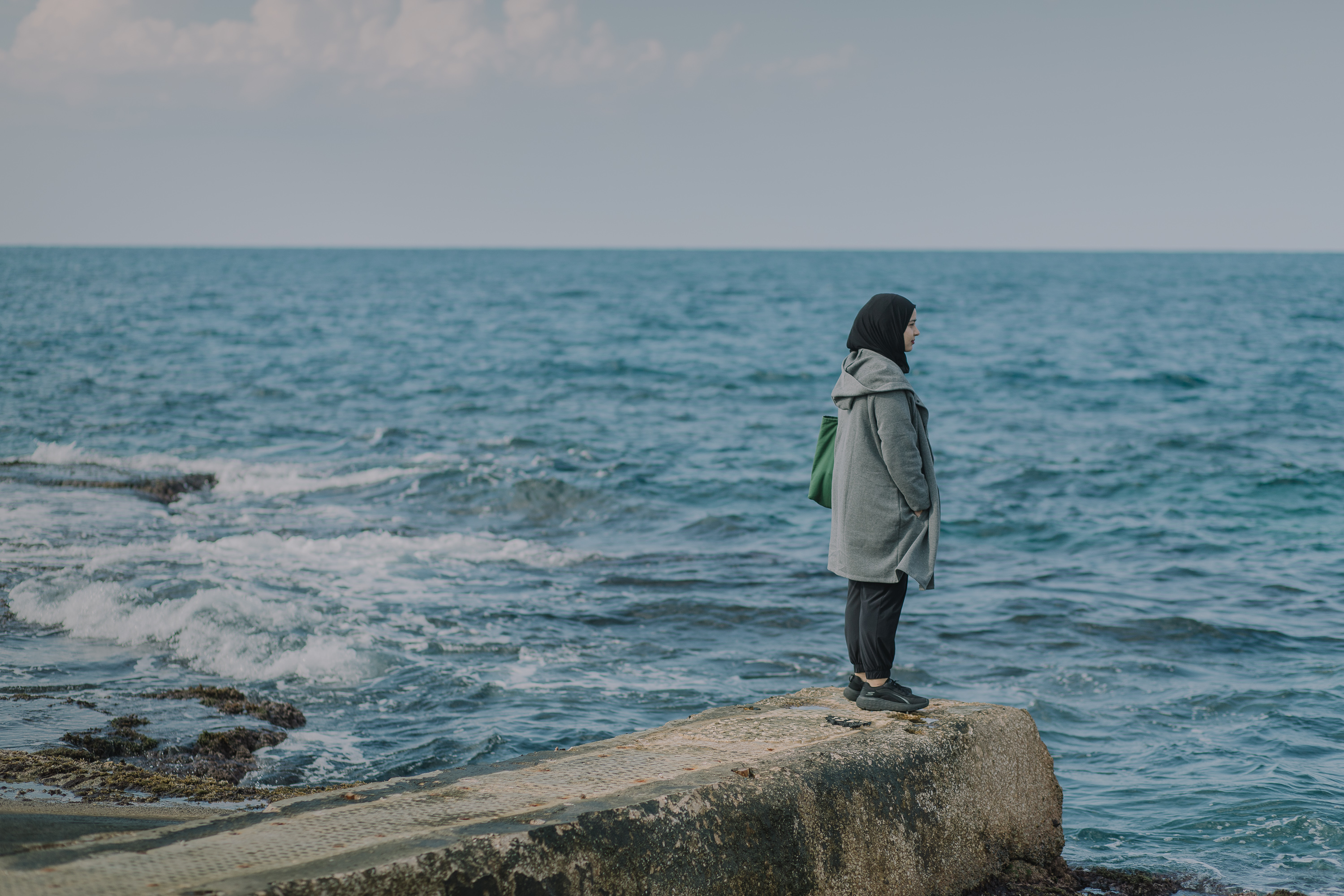 Shatha Hanaysha at Beirut's Corniche, Nov. 10, 2022. (Credit: Maria Klenner/L'Orient Today)
Shatha Hanaysha at Beirut's Corniche, Nov. 10, 2022. (Credit: Maria Klenner/L'Orient Today)
Hanaysha lets out a deep sigh and adds in a half-whisper: “It all went so fast. One minute we were joking around with some kids on the street and, what felt like the next, I suddenly saw Shireen lying on the ground.” She tried to reach for Shireen but the bullets kept coming. “I didn’t even know whether she was dead or alive until someone risked his life to evacuate us,” she says. “But she just wouldn’t wake up.”
Several independent investigations by media outlets such as CNN and The New York Times concluded that Abu Akleh’s death was a “targeted killing by Israeli soldiers”, while UN experts went as far as saying that the killing may constitute a war crime. Yet no one has been held accountable to date, and Hanaysha’s eyewitness account has been scrutinized and disputed by various news outlets, politicians and the Israeli government, in addition to many people on social media, with some accusing her of antisemitism.
“Even many Western journalists didn’t believe me — why? When it’s your turn, and something happens to you, I will stand with you because you’re a journalist like me. It’s our job to uncover and speak the truth.”
“We’re not allowed to say anything that shows Israel in a bad light. If we do, we’re called antisemites. Why does simply stating facts make us antisemites? One of my favorite cafes in Jenin is called Kafka. Kafka was a Jewish writer. Our issue is not with Judaism or Jewish people. It’s with the Israeli occupation. Calling us antisemites to censor us is just another weapon in their arsenal.”
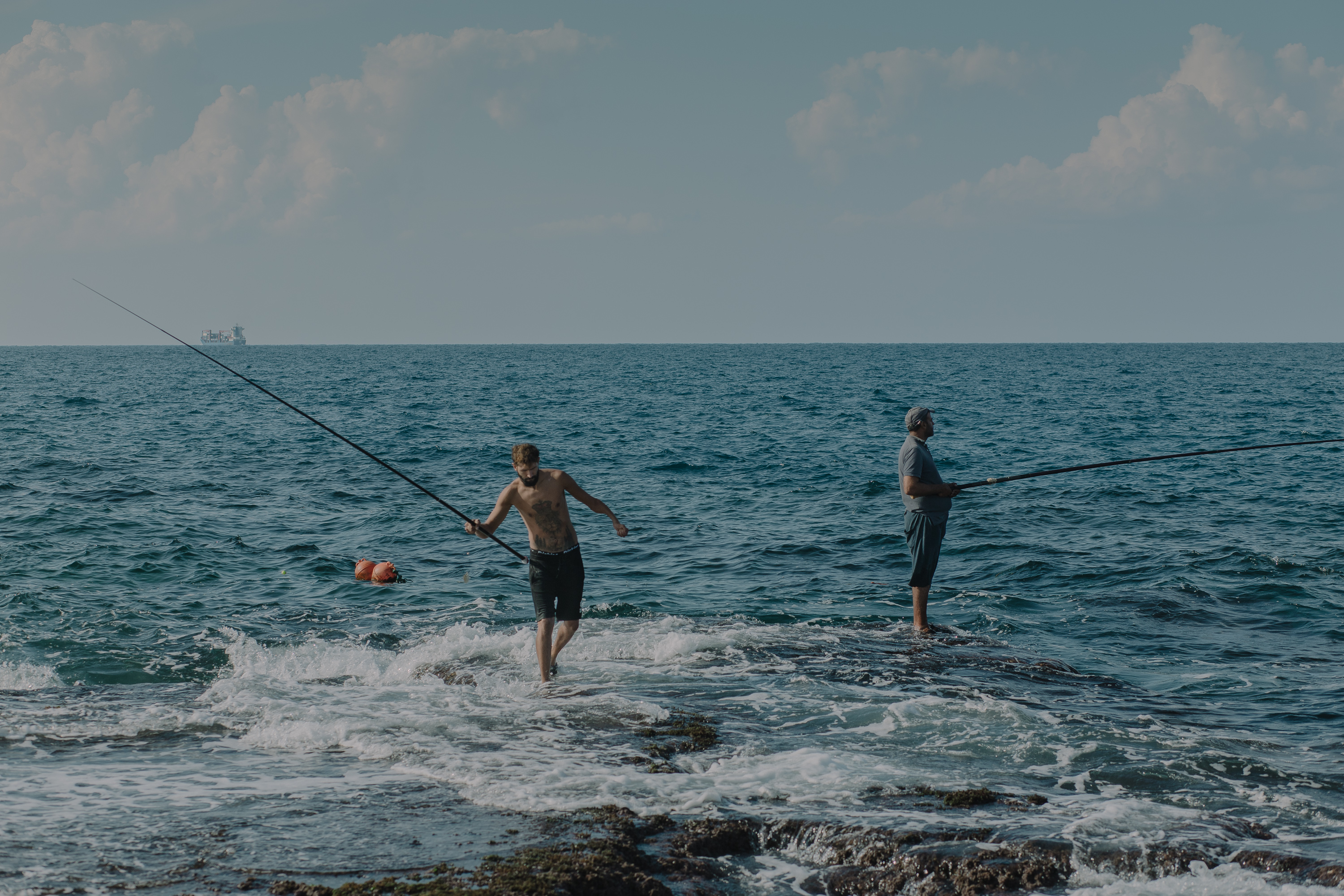 The Beirut waterfront, Nov. 10, 2022. (Credit: Maria Klenner/L'Orient Today)
The Beirut waterfront, Nov. 10, 2022. (Credit: Maria Klenner/L'Orient Today)
In the first of a series of rare public hearings Thursday, Sammoudi, who was shot moments before Shireen was killed, but survived, told UN investigators that the group was “wearing full journalist attire” and that there had been no militant activity nearby. The hearings are hosted by the Commission of Inquiry (COI) which was created by the UN Human Rights Council last year to “probe the root causes of the decades-long Middle East conflict.”
Suddenly “a bullet exploded in the air,” Sammoudi said at Thursday’s hearing, describing how he screamed “Go back!” before feeling “an explosion in my back.” It is clear, he said, holding up a photograph of his slain colleague, that “Shireen Abu Akleh was killed in cold blood, intentionally.”
Adjusting to life in Beirut
Though she’d never been to Lebanon before, Hanaysha grew up hearing stories about Beirut as her father studied at the Beirut Arab University in the 1970s. “Back then, he told me, Beirut was considered the capital of culture. My father always talked about his time here with so much love,” she says. “And he’s very sad to see what’s happening to Lebanon now.”
Despite the fact that her country neighbors Lebanon, and there are many cultural similarities, she had to get used to quite a few things when she arrived two months ago.
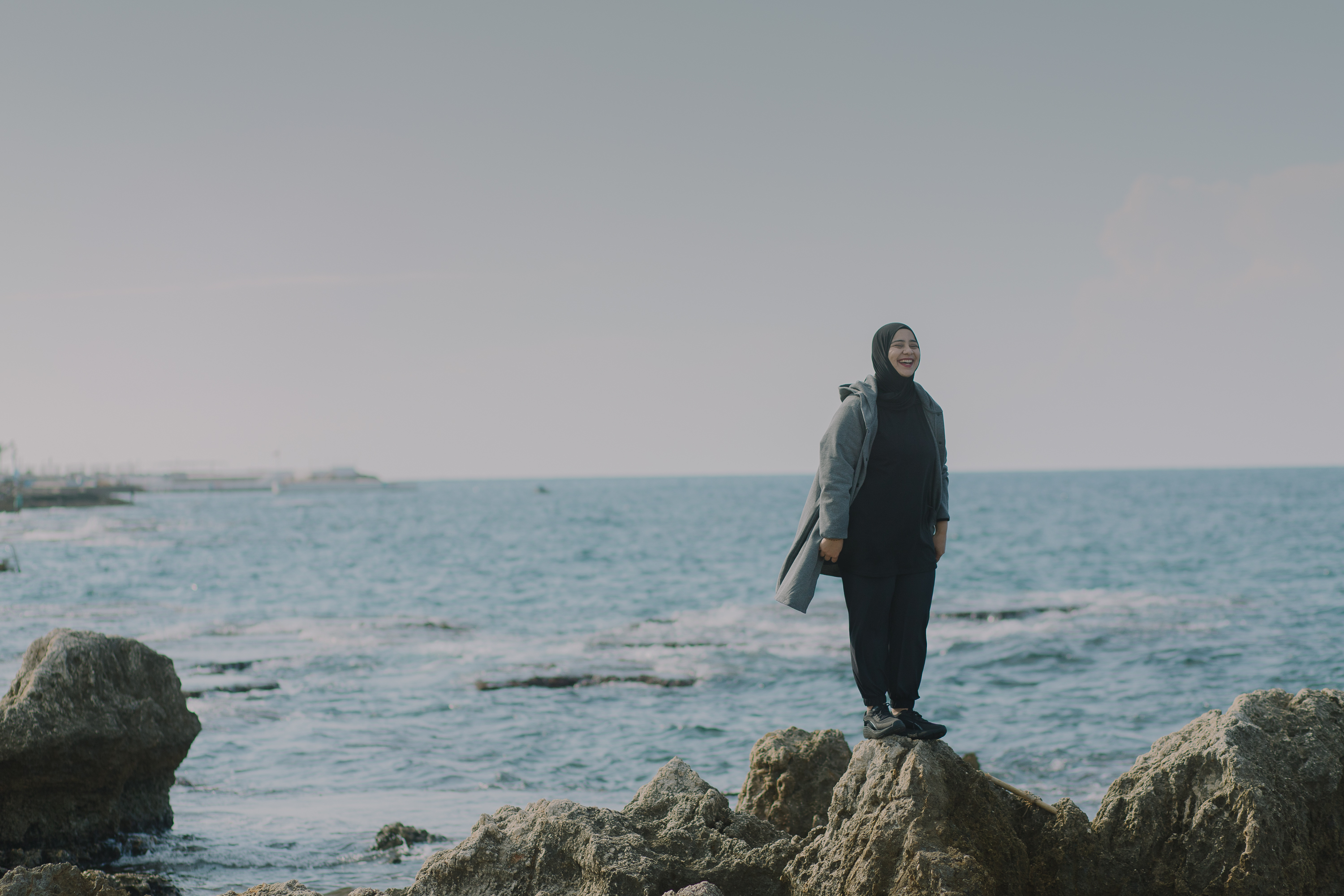 Shatha Hanaysha at Beirut's Corniche, Nov. 10, 2022. (Credit: Maria Klenner/L'Orient Today)
Shatha Hanaysha at Beirut's Corniche, Nov. 10, 2022. (Credit: Maria Klenner/L'Orient Today)
“When I tell people here that I’m Palestinian, I get mixed reactions. But when I specify that I’m from Palestine and lived there all my life, their eyes light up and they all show their support for our cause and tell me we’re brothers and sisters. Some have told me I’m a “fresh” Palestinian,” she says with a chuckle, “you know, like ‘fresh’ dollars.”
She also never dreamt of getting used to Lebanon’s electricity cuts. At the moment, in some areas it’s rare for Electricité du Liban, Lebanon’s state electricity provider, to provide more than an hour of power per day. Households that can afford it are forced to pay at least $100 to private generator providers to keep the lights on.
“It’s become a running gag,” says Hanaysha. “When people ask me: ‘Do you have electricity in Palestine?’ I answer ‘Yes, yes, we have electricity. We just have occupation.’”
“Everyone is just so kind to me,” she adds. “You know, they just ask me about Palestine, how they’re living there and why I came here. And they always tell me ‘if you need something, I'm your brother.’ Sometimes it makes me feel at home.”
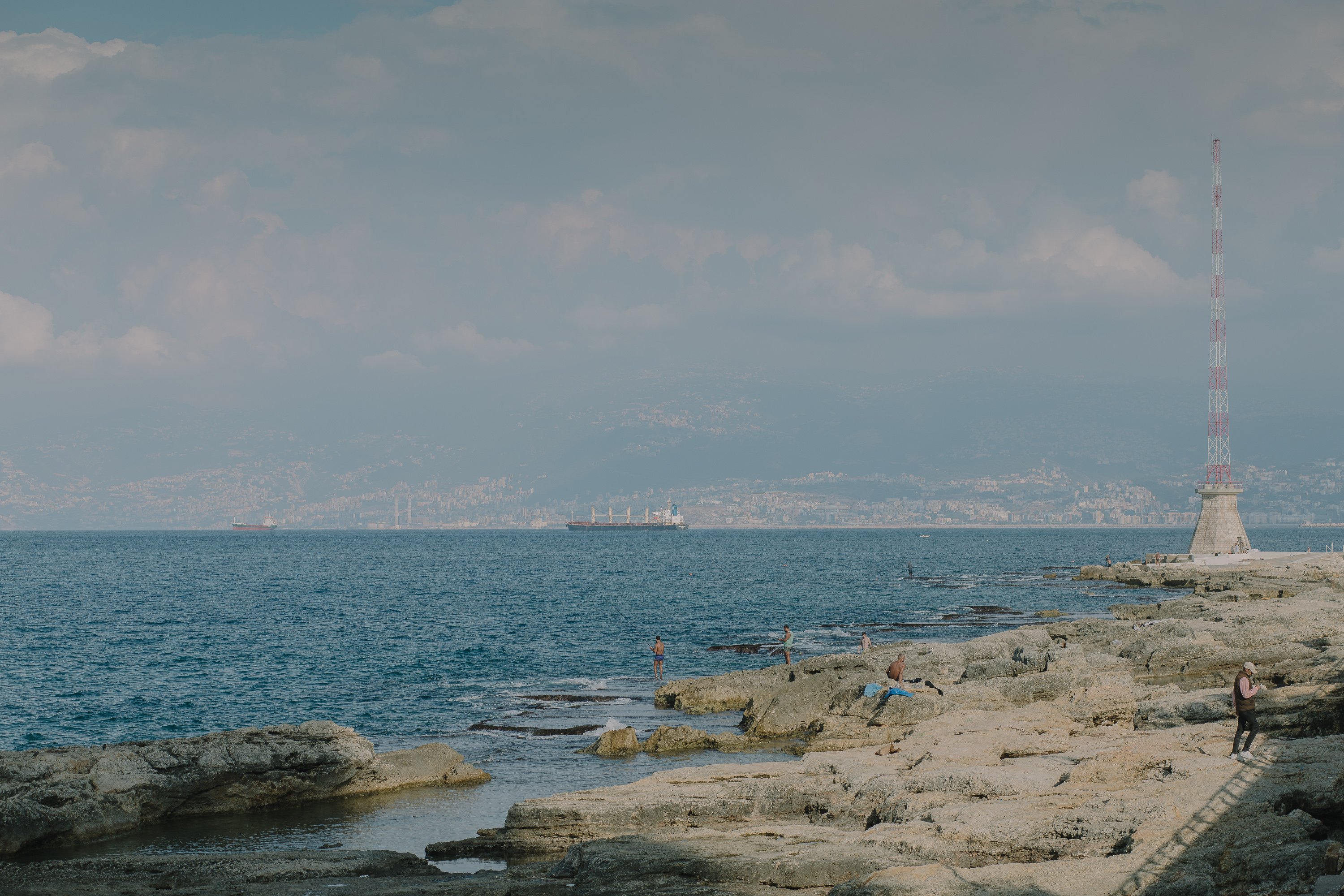 The Beirut waterfront, Nov. 10, 2022. (Credit: Maria Klenner/L'Orient Today)
The Beirut waterfront, Nov. 10, 2022. (Credit: Maria Klenner/L'Orient Today)
She never ceases to be flabbergasted by the “unbreakable bond” and perpetual longing expressed by the Palestinians she meets in Beirut who were born and raised here. “Even if they’re never set foot in Palestine, they describe their grandparents’ villages to me in excruciating detail,” Hanaysha says, incredulously. “They make them come alive again, even though Israel has destroyed them.” There’s been “a lot” of hugging, she adds.
It still gets lonely sometimes, Hanaysha says. “It’s a strange feeling to be so close to home, yet so far away.” It doesn’t help that since she left, the situation in the occupied West Bank has gravely escalated, with Israeli forces ramping up illegal incursions and indiscriminate killings in Jenin and Nablus.
“After what happened with me, my family and friends told me, you know, go to Lebanon, get a master's degree and take a break from journalism, from what is happening in Palestine, but I can't,” she says. “If there is an operation in some area, I’ll be awake all night to collect all the news to know exactly what happened. I’ll even call all my sources to make sure. This is what makes me me, I always need to know the truth so I can spread it.”
The year 2022 is on its way to becoming the deadliest in the occupied West Bank since 2005, when OCHA, the UN’s humanitarian coordination agency, began systematically collecting data about Palestinian fatalities, UN Middle East envoy Tor Wennesland said in recent days.
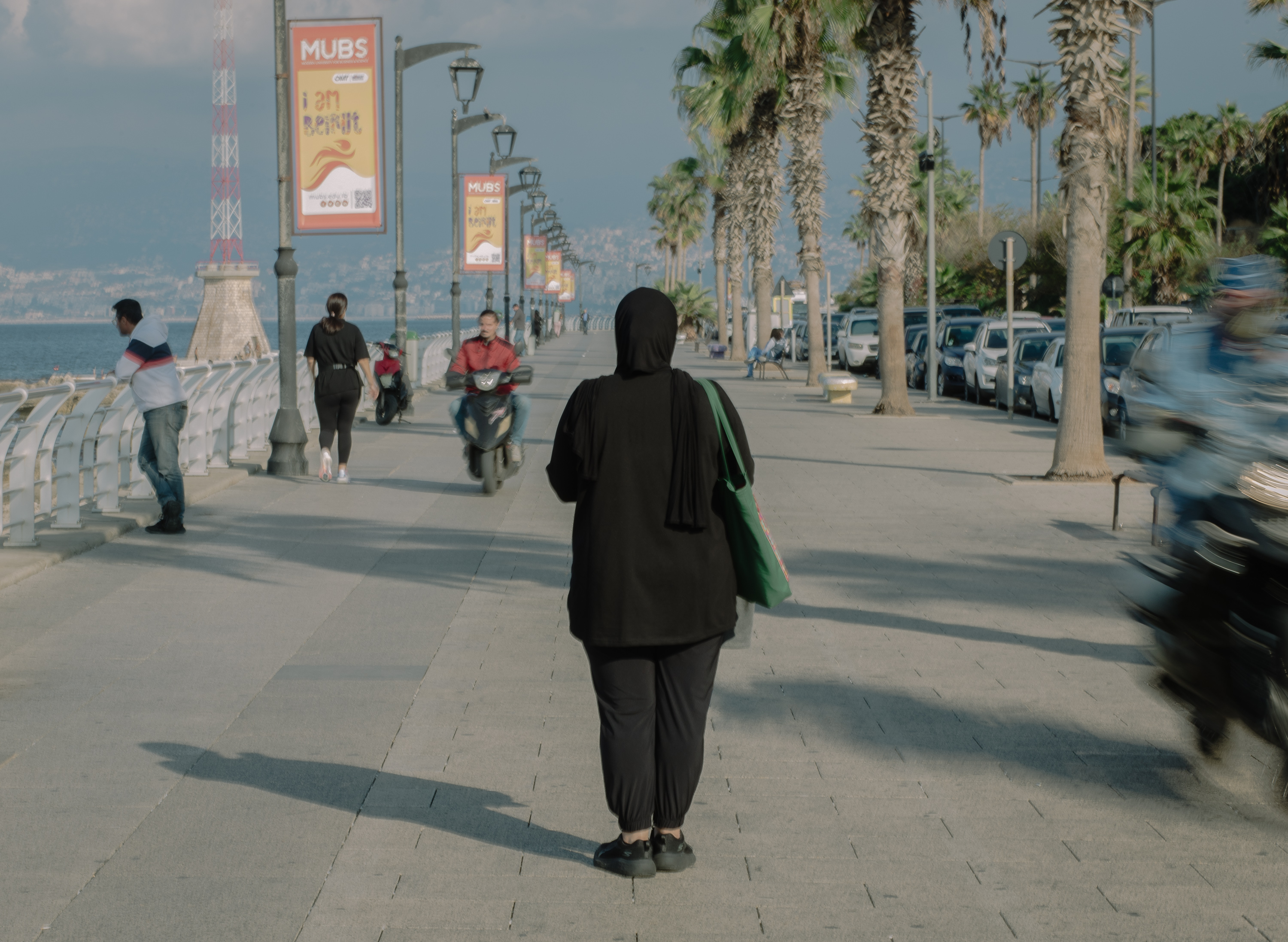 Shatha Hanaysha at Beirut's Corniche, Nov. 10, 2022. (Credit: Maria Klenner/L'Orient Today)
Shatha Hanaysha at Beirut's Corniche, Nov. 10, 2022. (Credit: Maria Klenner/L'Orient Today)
Between Sept. 21 and Oct. 25, Israeli security forces killed 32 Palestinians, including six children, Wennesland told the UN Security Council last month. Another 311 Palestinians, including one woman and eight children, were also injured during that period. They are among the more than 120 Palestinians said to have been killed by Israeli occupation forces so far this year in the West Bank and Jerusalem.
Coming here, to Beirut’s Corniche, has a way of calming Hanaysha on days when it gets to be too much, she says. “I’ll sit down on one of the benches facing the sea and get lost in its endless movements.”
Hanaysha says that, although she is grateful to have been awarded the scholarship in honor of Shireen, and that she is learning a lot at AUB, it has been hard to come to terms with the fact that she would not be here in Beirut doing a Master’s in media studies if Shireen were still alive.
“I would give anything to be back in Palestine instead, if that meant that Shireen was still alive. But she’s not.”
“But I try to stop myself from going back to that moment and focus on the future instead,” she says. “Even if we will never get justice for Shireen, because the world is not interested in justice, then I will honor her by becoming the best journalist I can be and keep telling the truth. With bravery and compassion, just like she did.”
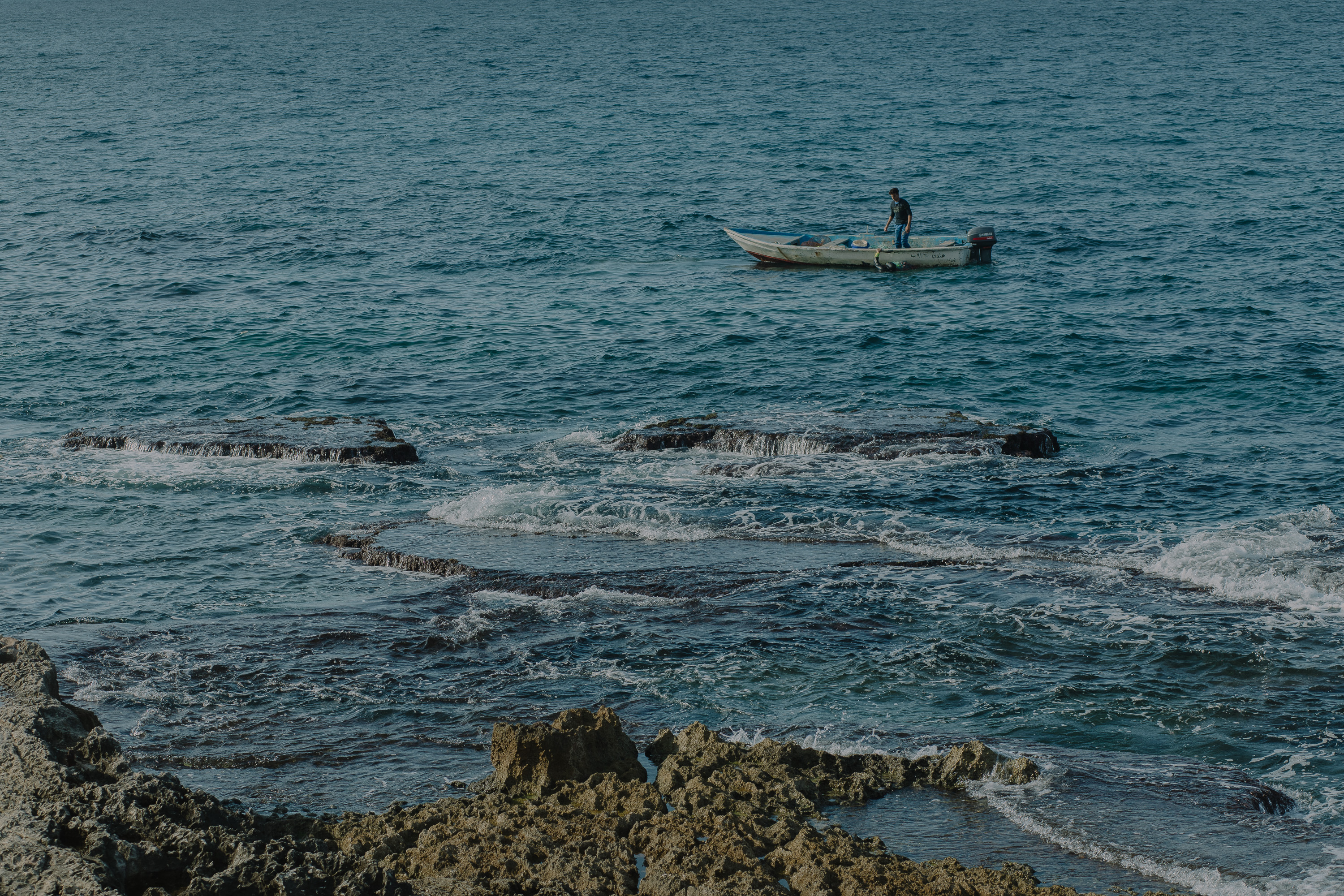 The Beirut waterfront, Nov. 10, 2022. (Credit: Maria Klenner/L'Orient Today)
The Beirut waterfront, Nov. 10, 2022. (Credit: Maria Klenner/L'Orient Today)

